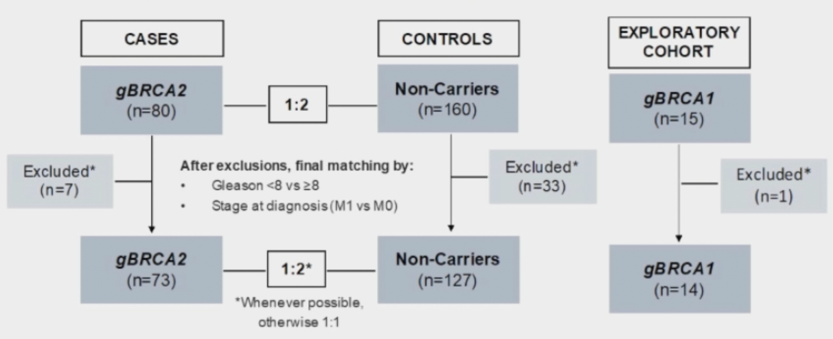In this multicenter case-control study, germline BRCA2 carriers were matched 1:2 to known non-carriers by Gleason score and stage at diagnosis (M0 vs M1). A minimum of 60 cases-120 controls was required to prove a 5-year cause-specific survival (CSS) rate of 60% vs 85%. The study design is as follows:

The primary aim was to confirm the independent prognostic role of germline BRCA2 in prostate cancer CSS. Secondary aims included exploring the clinical impact of somatic events in BRCA2, RB1, MYC, PTEN, and TMPRSS2-ERG by FISH. Kaplan Meier and Cox-regression models were used to identify associations between molecular characteristics and outcomes.
For this study, there were a total of 73 germline BRCA2 carriers and 127 non-carriers that were eligible. Germline BRCA2 carriers were younger at diagnosis (p=0.02) and had more often T3/4 (p<0.001) disease than non-carriers, but no other significant differences were found. In terms of molecular characteristics, germline BRCA2 carriers presented with more somatic alterations than non-carriers (p<0.001), including BRCA2 loss, RB1 loss, and MYC amplification. BRCA2 was also more frequently co-deleted with RB1 (Pearson correlation 0.96; p=0.001). Germline BRCA2 mutations were independently associated with CSS (HR 3.70; p=0.008):

CSS was also shorter in germline BRCA2 carriers who present with somatic BRCA2-RB1 co-deletion or MYC amplification compared with germline BRCA2 without such alterations. A multivariable model confirmed the independent prognostic value of somatic BRCA2-RB1 co-deletion (HR 4.13; p=0.004) and MYC amplification (HR 2.27; p=0.033) for CSS.
Dr. Mejorada concluded with the following take-home messages:
- PROREPAIR-A is the largest series of germline BRCA2 tumors assembled to date to explore associations between somatic alterations and clinical outcomes in prostate cancer
- This study confirmed the independent prognostic value of germline BRCA2 mutations for CSS in prostate cancer
- Somatic alterations in BRCA2, RB1, and MYC were significantly more frequent in germline BRCA2 carriers than in non-carriers; most cases with BRCA2 LOH also represented RB1 loss (co-deletion)
- Somatic BRCA2-RB1 co-deletion and MYC amplification define an aggressive subtype of prostate cancer with poor clinical outcomes, in both germline carriers and non-carriers
Presented by: Rebeca Lozano Mejorada, MD, Prostate Cancer Clinical Research Unit, Spanish National Cancer Research Centre (CNIO), Madrid, Spain
Co-Authors: R. Lozano Mejorada,1 E. Castro Marcos,2 I.M. Aragon,1 H. Thorne,3 F. Lopez Campos,4 A. Sanz,1 C. Alonso,5 U. Anido,6 M.J. Juan Fita,7 A.M. Gutierrez Pecharromán,8 M. Ramirez-Backhaus,9 J. Balmana,10 I. Chirivella Gonzalez,11 G. Llort,12 N. Romero Laorden,13 S. Arevalo Lobera,14 J. Rubio Briones,9 C.C. Pritchard,15 S. Sandhu,3 D. Olmos Hidalgo1
1 Prostate Cancer Clinical Research Unit, Spanish National Cancer Research Centre (CNIO), Madrid, Spain, 2 Medical Oncology, Hospital Universitario Virgen de la Victoria; Instituto de Investigación Biomédica de Málaga, Málaga, Spain, 3 Medical Oncology, Peter MacCallum Cancer Centre, Melbourne, Australia, 4 Radiation Oncology Department, Hospital Universitario Ramon y Cajal, Madrid, Spain, 5 Medical Oncology Department, Hospital Universitario de la Princesa, Madrid, Spain, 6 Medical Oncology Department, CHUS - Complejo Hospitalario Universitario de Santiago de Compostela SERGAS, Santiago De Compostela, La Coruña, Spain, 7 Medical oncology, Fundación Instituto Valenciano de Oncología, Valencia, Spain, 8 Pathology, Hospital de Getafe, Getafe, Spain, 9 Urology Department, Fundación Instituto Valenciano de Oncologia, Valencia, Spain, 10 4.Hereditary Cancer Genetics Group, VHIO. Medical Oncology Department, Vall d'Hebron University Hospital, Barcelona, Spain, 11 Medical Oncology Department, Hospital Clinico Universitario de Valencia, Spain, 12 8. Hereditary Cancer Unit and Medical Oncology Department, Corporació Sanitaria Universitària Parc Taulí de Sabadell and Consorci Sanitari de Terrassa, Barcelona, Spain, 13 Medical Oncology Department, Hospital Universitario de la Princesa, Madrid, Madrid, Spain, 14 Medical Oncology Department, Hospital Donostia, San Sebastian, Spain 15 Laboratory Medicine, University of Washington, Seattle, WA, USA
Written by: Zachary Klaassen, MD, MSc – Assistant Professor of Urology, Georgia Cancer Center, Augusta University/Medical College of Georgia Twitter: @zklaassen_md 2020 European Society for Medical Oncology Virtual Congress (#ESMO20), September 19th-September 21st, 2020.
References:
- Castro E, Jugurnauth-Little S, Karlsson Q, et al. High burden of copy number alterations and c-MYC amplification in prostate cancer from BRCA2 germline mutation carriers. Ann Oncol 2015 Nov;26(11):2293-2300.
ASCO 2020: PROREPAIR-A: Clinical and Molecular Characterization Study of Prostate Cancer (PC) Patients with and Without Previously Known Germline BRCA1/2 Mutations


